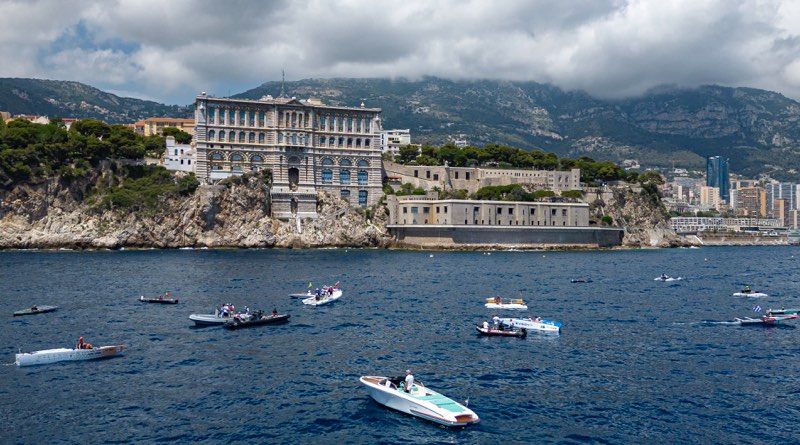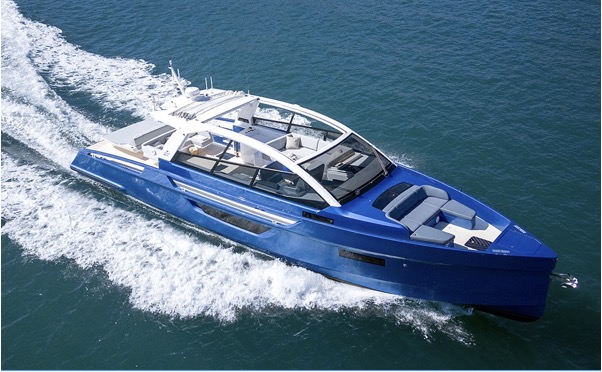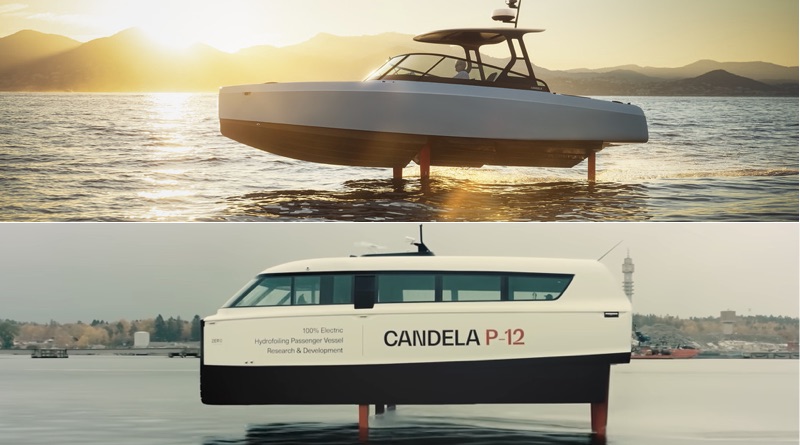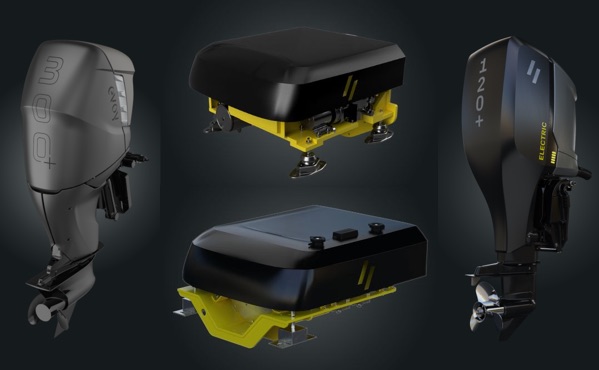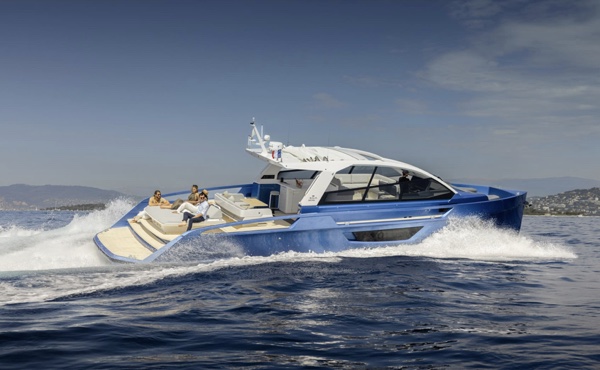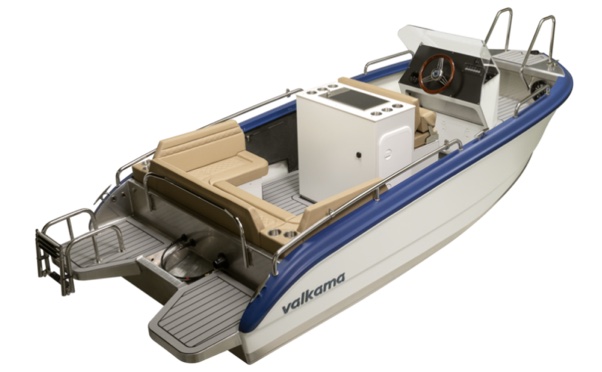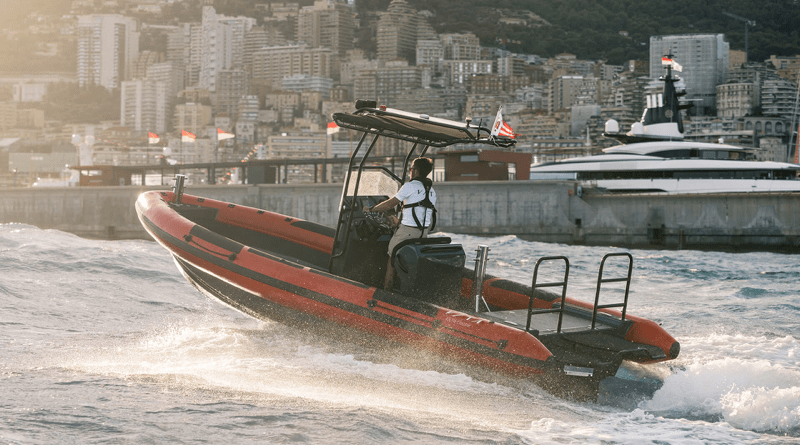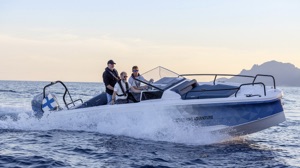Monaco Energy Boat Challenge bigger and better than ever for 2024
The eleventh edition of the Monaco Energy Boat Challenge (MEBC) takes place this week at the Yacht Club de Monaco (YCM) with the most ever student teams and commercial electric boat manufactures attending and an expanded programme of seminars and conferences, including the first Annual General Meeting of the recently formed International Electric Marine Association (IEMA).
50 student teams competing
There are 50 student teams competing in the Challenge, racing over three days in three classes: the Energy Class and Solar Class is comprised of student teams from 40 international universities, while the Open Sea Class has 13 commercial electric boats competing along with 3 student prototype boats in the SeaLab class.
On shore events taking place in the clubhouse include
- a Job Forum for the students to meet with boat manufacturers and others in the electric propulsion sector
- a two day conference covering the topic of alternative fuels and advanced state of the art technologies on day one with the fifth edition of hydrogen round table on day two
- the MEBC e-Sport Championship where competitors choose the performance elements of their boat within a certain budget, then race on a virtual version of the MEBC course and
- Tech Talks from each of the university teams where they present the details and research behind their boat projects to an international Jury during the Tech Talks. This year a new format is launched with prizes for the best 6 projects in each category.
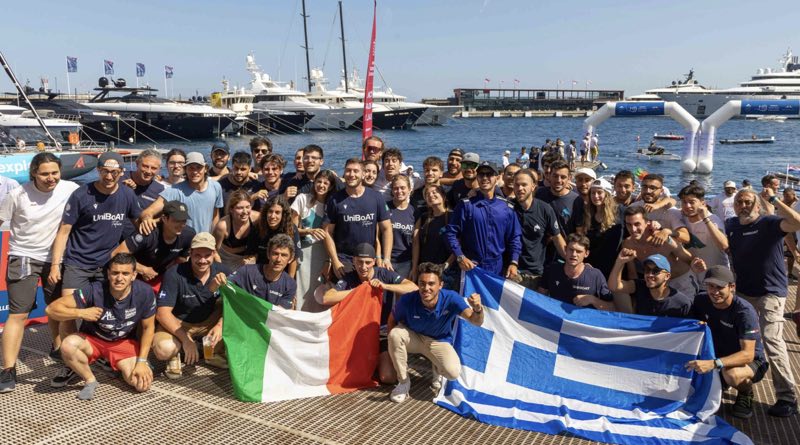
All of this is powered through an E-Dock lined with AC and DC chargers from Aqua superPower. The YCM was the site of the first installation in the world of the Aqua marine high speed charger and last year’s Challenge saw the first E-Dock for the Energy Boat Challenge. This year’s updated version enables fast and reliable charging for up to 20 electric boats concurrently.
There are flexible solar panels on the E-Dock’s roof, and there is also a floating prototype pontoon producing green hydrogen from renewable energy sources in Monaco. This project provides Type 4 cylinders of hydrogen to the teams using it in their propulsion systems, thanks to SBM Offshore and CTS (Composite Technical System).
The number of student and commercial teams participating, the involvement of all the major players in the electric boat industry and larger yachting industry, the breadth of leading edge technologies presented both off and on shore – they are a vivid demonstration of how much the MEBC and electric boating have grown in the past decade.
Monaco Energy Boat Challenge started in 2014
In 2014 the MEBC was launched as a solar-boat-only competition for 23 teams from 10 countries. The next year saw the addition of the Offshore class and in 2018 the Energy Class was introduced followed by the Conference, Exhibition and Job Forum in 2019 along with first Monaco Hydrogen Round Table coinciding with 2 hydrogen boats competing in the Challenge.
Bernard d’Alessandri, YCM General Secretary says the Club’s ambition is to be a major player in the drive for sustainability and this meeting of many players is a key element of bringing about the environmental transition. “Faced with the climate emergency, it is imperative that living proof of progress replaces the promises” he states. “We want to demonstrate that the technology exists and is efficient. That is the raison d’être of the Monaco Energy Boat Challenge, which is positioning the Principality as a driving force for responsible yachting.”
The brochure and full programme of this year’s events can be viewed and downloaded through the link below, but here is a quick overview of what is happening through the week:
Download the Monaco Energy Boat Challenge 2024 Programme
Energy Class
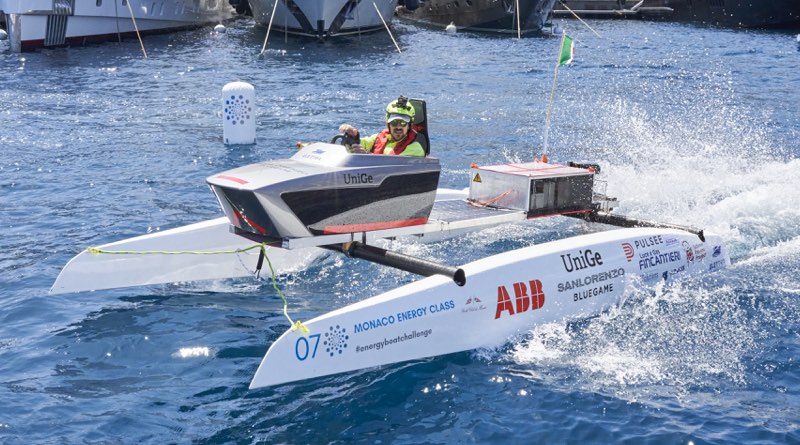
The Energy Class was launched by the YCM in 2018 to expand the student teams to universities that may hot have courses in naval architecture but have strong engineering programmes. The Yacht Club supplies the teams with the same design catamaran hull which the teams that outfit with their cockpit and the most efficient and durable propulsion system using renewable alternative energy sources limited to a given quantity of energy (max. 10kWh stored on board).
Some projects use battery electric propulsion, some use hydrogen cell or a combination of battery and cell, some augment their systems with solar power – the ingenuity and accomplishments of the students are impressive.
The boats house one pilot each and compete in three events:
- Slalom: Boats navigate a slalom course in the open waters just east of the YCM with the fastest times determining the winner (assuming all slalom gates are navigated).
- Speed Record: Boats are timed over a 1 kilometre distance in the same waters, with the speed course inspired by the boundaries of the original 1904 course where the Yacht Club de Monaco hosted the first international powerboat contest.
- Endurance Challenge: For the endurance challenge, boats race for as long as possible on the course to demonstrate their boats’ energy capabilities (with the course open for 4 hours).
- Championship Race: This event takes place within the marina of the YCM. Two teams compete going opposite directions where they have to navigate an outer loop and inner loop and then come out of that course to go head to head for the final straightaway. This is a spectacularly entertaining ‘knockout’ event where all of the students gather to roar their encouragement and support.
Last year’s winner (and in 2022) was the Uniboat Solar Team from the Università di Bologna. Their solar-powered boat is a blend of academic excellence and innovation, with consecutive wins highlighting both their technical prowess and commitment to a greener maritime future.
This year they are joined by 17 other teams:
- Canada: EXOCET POLYTECHNIQUE – Polytechnique de Montréal
- Chile: CÓNDOR MOTORSPORT – Pontifical Catholic University of Chile
- Croatia: ADRIA ENERGY BOAT TEAM – University of Rijeka
- France: HYDROGADZ / MONACO MARINE – ENSAM (École nationale supérieure d’Arts et Métiers)
- France: HYDROVINCI TEAM – Leonard de Vinci University Centre
- France: NÉRÉIDES – Université de Technologie de Troyes
- France: TAMEO ENSTA – ENSTA Institut Polytechnique de Paris
- Germany: WANNSEA – Technische Universität Berlin
- Greece: OCEANOS NTUA – National Technical University of Athens 6th
- India: SEA SAKTHI – Kumaraguru College of Technology
- Indonesia: HYDROS TEAM UI – University of Indonesia
- Italy: MESSINA ENERGY BOAT – Università degli Studi di Messina
- Italy: PHYSIS PEB – Politecnico di Milano
- Italy: POLITO H2FLY – Politecnico di Torin
- Italy: UNIBOAT – Alma Mater Studiorum Università di Bologna
- Portugal: TÉCNICO SOLAR BOAT – Instituto Superior Técnico
- Switzerland: ELETTRA UNIGE TEAM – University of Geneva
- UK: RIVIERA RACING – University of Cambridge 1st
Get details on all MEBC Energy Class boats
Solar Class
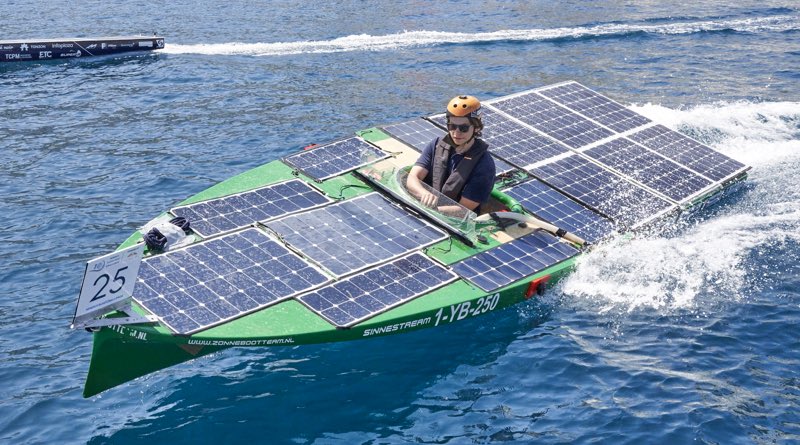
The Solar Class competes in the same races as the Energy Class, but at different times.
The boats all have battery-electric propulsion systems with a full battery for the start of the race. The are allowed to harvest solar energy during the race – especially important in the Endurance challenge. The engineering challenge is to create as large a space as possible for solar panels and battery while also being conscious of the effect on the boats’ speed and manoeuvrability. Some teams have incorporated foiling technology.
Last year’s winner, the Sunflare Solar Team, has been participating in the MEBC since the first 2014 solar only event. They have a very hands-on approach to innovation, with the team prioritizing efficiency and weight reduction. Their motto is simple: for the best results, craft it yourself.
Competing in the 2024 Challenge:
- Austria: TGM – SOLAR BOAT TEAM – Technological Museum of Crafts – HTL Wien XX
- Belgium: UANTWERP SOLAR BOAT TEAM – University of Antwerp
- Hungary: BME SOLAR BOAT TEAM – Budapest University of Technology and Economics
- Netherlands: HAN SOLAR BOAT – HAN University of Applied Sciences
- Netherlands: HVA TEAM SOLAR – Hogeschool van Amsterdam
- Netherlands: SOLAR BOAT TWENTE – University of Twente
- Netherlands: SUNFLARE SOLAR TEAM – Fondation Sunflare Solarteam
- Poland: AGH SOLAR BOAT AGH – University of Science and Technology Krakow
- Poland: GUT SOLAR BOAT TEAM – Gdańsk University of Technology
- Portugal: TÉCNICO SOLAR BOAT – Instituto Superior Técnico
- South Africa: SIYAHAMBA SOLAR BOAT – Durban University of Technology
- Spain: CLEAN ENERGY SHIP UVIGO – University of Vigo
- UK: SOLEX SOLAR BOAT – University of Exeter
Get details on all MEBC Solar Class boats
Open Sea Class and SeaLab Class
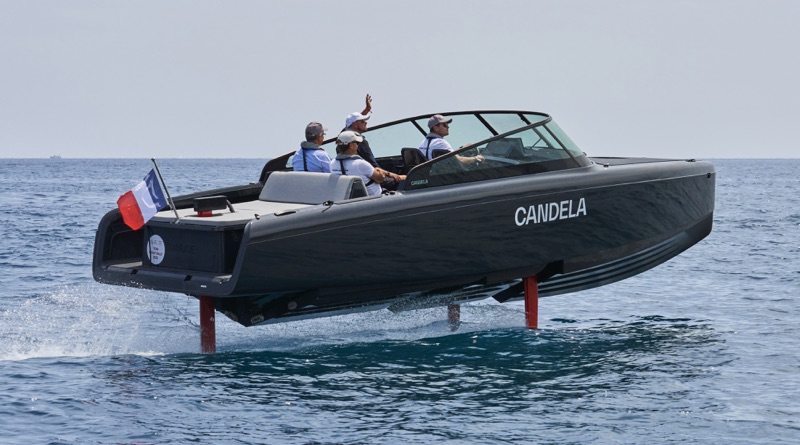
The Open Sea Class started life as the Offshore Class in 2018 and has evolved into the class for commercial electric boat entries and also prototypes from students and teams that want to develop their projects outside the strict rules of the Energy and Solar classes.
The boats compete in similar, but different events from the student teams.
- Manoeuvrability Challenge: replaces the slalom event that Energy and Solar classes compete in. For the Open Sea and SeaLab boats, they are required to navigate a manoeuvrability course set within the confines of the YCM marina, with a maximum speed of 3 knots (3.5 mph / 5.5 kmh)
- In a sort of combination of the speed and endurance races, the Open Sea and SeaLab boats will participate in a 21 nautical mile round trip between Monaco and Cala del Forte in Ventimiglia, with timings for each leg. Contestants are allowed to recharge if needed, and the event also provides a platform for showcasing their innovative boats to the Italian audience.
You can read the Plugboats coverage of last year’s Open Sea Class through the link below.
Plugboats report on Commercial e-boats at the 2023 MEBC
Competing the 2024 Rally (click the tiles at the bottom of this article for links to the company’s websites for more information):
- Axopar 25 powered by an Evoy Outboard Storm 300hp+. This boat was the winner of the 2023 Gussies for electric boats up to 8m / 26 ft.
- De Antonio E23 is the Spanish yard’s first electric model, the Official Electric Boat of the 37th America’s Cup. The E23 will be used in setting the Cup’s racecourse and monitoring the assisting the new autonomous electric racecourse marks throughout the competition.
- Deep Silence from Sialia Yachts, powered by Ampros propulsion, is a high-performance electric yacht without compromise that provides both performance, range and luxury.
- Dixmude is a Candela C-8 that was in the first E-Rally last year and showcases the company’s advanced hydrofoiling technology. It is being presented by Candela’s French dealer, Sud Plaisance.
- e’dyn is powered by a 25 kW E’dyn outboard.
- El-Iseo is another boat that was in last year’s rally. A classic Riva yacht with electric propulsion, last year’s El-Iseo was the prototype model created for the legendary Italian boatyard’s 180th anniversary . It is now in full production mode.
- Goldfish X9 is a 9 metre RIB powered by Evoy inboard Hurricane 400hp+
- Madblue Marine P-01 is a prototype demonstrator of a hydrogen powered leisure boat, engineered with a 180HP+ electric motor to provide zero-emission sailing without giving up a good range.
- Poséidon has been developed by Inocel as its first marine demonstrator featuring a propulsion chain integrating the company’s hydrogen fuel cell boat to offer performance and autonomy comparable to its thermal equivalent.
- SeaDog and Seal Both the Seadog and the Seal are RIBs from electric boat manufacturer Vita, with the larger Seal (7m / 26 ft) intended for leisure or commercial boat use and the SeaDog (5.8m / 19 ft) designed from the outset as a workboat for marinas, ports and harbours.
- SEALAB#5 from Italy’s Sealence is the latest laboratory boat equipped with Sealance’s new generation DeepSpeed jet, with an input power up to 230kW, and 3 “best in class” SafeLi batteries.
- Valkama Tender is an aluminum boat with top speed of about 25 knots, designed with sustainability materials, refits, life-cycle management and recycling built in.
Tridente – Maserati - The Bubble from SeaBubbles is an innovative transportation project involving electric-powered, hydrofoil boats that “fly” above the water surface carrying up to 5 passengers.
- Tridente from Maserati and Vita has been engineered to bring the hallmarks of the Maserati experience to the water. Built for lake and coastal day cruising, the Tridente has peak power of 440kW (≈600hp) and battery capacity of 252 kWh.
SeaLab Class boats
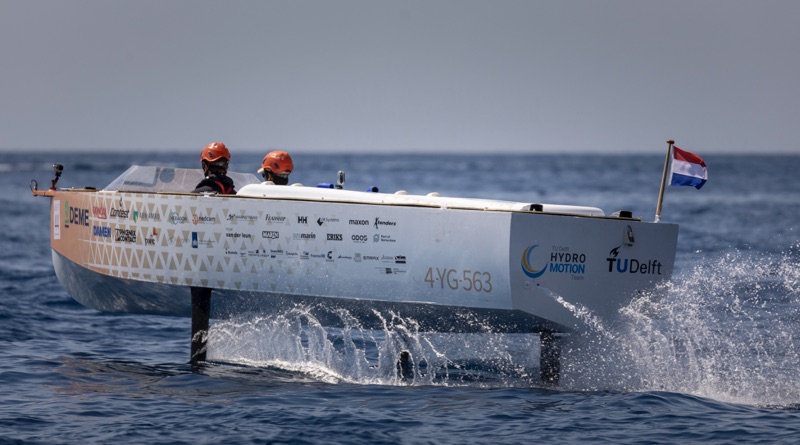
The SeaLab vessels do not hold the standard European certifications, but offer an exciting glimpse into international design philosophies and engineering approaches.
- TU DELFT HYDRO MOTION is a hydrogen-powered flying boat from one of the original teams in the 2014 Challenge who have challenged themselves to build more and more innovative boats every year. This yea’r sproject has been built specifically to be the first hydrogen boat to cross the North Sea.GREENFOILING is a project from 36 students attending the five Universidad Politécnica de Madrid (UPM) schools. They have gone from a competitive team to an R&D project, collaborating with industrial partners to develop Spain’s first hydrogen-powered hydrofoil boat.
The 14th Monaco Energy Boat Challenge kicks off Tuesday with timed qualification trials for all of the boats competing in the Energy and Solar classes, with the Monaco to Ventigmilia E-Rally takng place on Wednesday along with the start of the Slalom, Speed and Endurance races.
This looks to be an exceptionally exciting week for electric boating, especially with the Hydrogen Round Table, Advanced Yachting Technology session and first Annual General Meeting of the International Electric Marine Association.
Keep an eye on Plugboats social media for updates.
Electric Boat Companies in MEBC 2024 – click tile for links

At Ampros we develop electric propulsion systems for those who love water travel, appreciate silence and care for the planet. Our product is a modular solution for electrifying a boat propulsion system. It is based on high-tech components, so it can be adapted to the requirements of any specific project.
OUR SOLUTIONS ARE VERSATILE
AMPROS has an electric propulsion system for any type of boat.
We are also ready to design a custom solution for your needs.
MOTOR YACHT • DAY BOAT • SOLAR YACHT • SAILING YACHT • FERRY • CUSTOM
HYBRID SOLUTIONS
ICE RANGE EXTENDER
The diesel generator is an additional source of energy that can help you cover long distances without recharging in port.
HYDROGEN RANGE EXTENDER
This system has a higher energy density than pure electric and is more environmentally friendly than diesel-based range extenders.
Sokolow, Poland

Axopar has joined forces with Evoy motors to produce Evoy electric version of their Axopar 25. Jan-Erik Viitala, Founding Partner of Axopar, says “Our partnership with Evoy is a perfect example of two great companies, on a joint mission, to expand the boating community and offer new ways of mobility for the future.”

Hydrofoiling electric boats and ferries, made in Sweden.
Transforming transport on the water with technology; enabling electrification and vastly improving performance vs. combustion engines.
Our ultimate purpose is to speed up the transition to fossil fuel-free lakes and oceans by re-thinking efficiency in marine transportation to radically push the performance boundaries of electric boats and ships.
At Candela, we care about doing something good for the planet and all its species. Coming from 20 different nations, we share a conviction that kindness combined with deep knowledge in science, has revolutionary power.
Location: Lidingö, Sweden

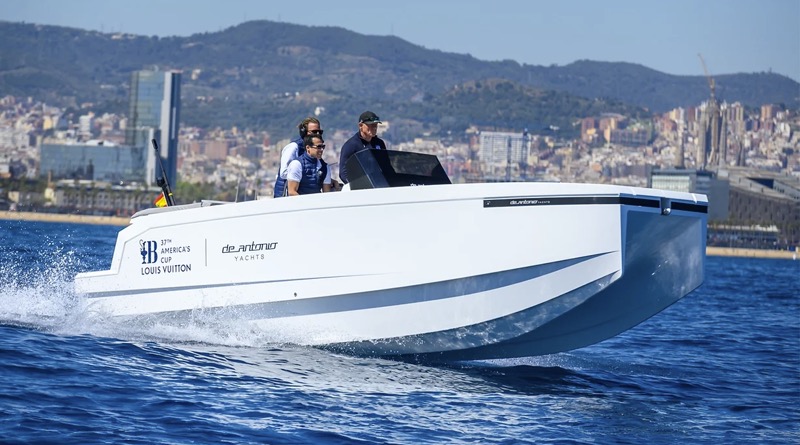 The most advanced technologies are used for the design, engineering, and construction in De Antonio Yachts, as well as an international team of specialists in each area. That is why the latest solutions, the highly demanded features, and the trendiest design has caused a notorious impact in the boat industry and brought De Antonio Yachts as one of the leaders in the day boat market.
The most advanced technologies are used for the design, engineering, and construction in De Antonio Yachts, as well as an international team of specialists in each area. That is why the latest solutions, the highly demanded features, and the trendiest design has caused a notorious impact in the boat industry and brought De Antonio Yachts as one of the leaders in the day boat market.
The E23 is the brand’s first 100% electric boat, the beginning of a new era. An innovative model, which concept is based on maximum efficiency. Its compact proportions with a catamaran architecture integrates a foil between its hulls, giving it unique emission-free sailing performance in its segment while offering a practical and comfortable space on deck, with a careful design all throughout details and finishes. A model that combines cutting-edge technology and design
Location: Barcelona, Spain


ELECTRIC BOATING POWERED BY EVOY
Norway has led the world’s adoption of electric cars.
Evoy and Norway will lead the world’s adoption of electric boats.
Evoy brings “irresistible boating” to the modern boater. An experience by delivering long-lasting Electric Boat Motor systems ranging from 120-400 hp continuous, accelerating the transition to emission free, blissfully quiet and sustainable boating.
Reliable
A combustion engine has on average over 2000 parts. An Evoy motor has only 4 moving parts.
Fast-charging
Offering flexible charging solutions from standard AC to fast DC – charging in less than an hour.
Smart
Remote support & maintenance, location services, updates and charge status at your fingertips.


INOCEL is a game-changer in the fuel cell industry, dedicated to providing clean energy solutions for a net zero future. We are committed to the development and production of hydrogen fuel cell systems that are compact, efficient, and reliable offering a real alternative to fossil fuel engines. With our cutting-edge technology, we aim to revolutionize the way we power our world for generations to come.
France

We Design, Manufacture And Distribute Hydrogen Powered Boats.
We Also Bring The Specialised Expertise And Partnerships To Implement The Required Green Hydrogen Infrastructure.
Madrid, Spain

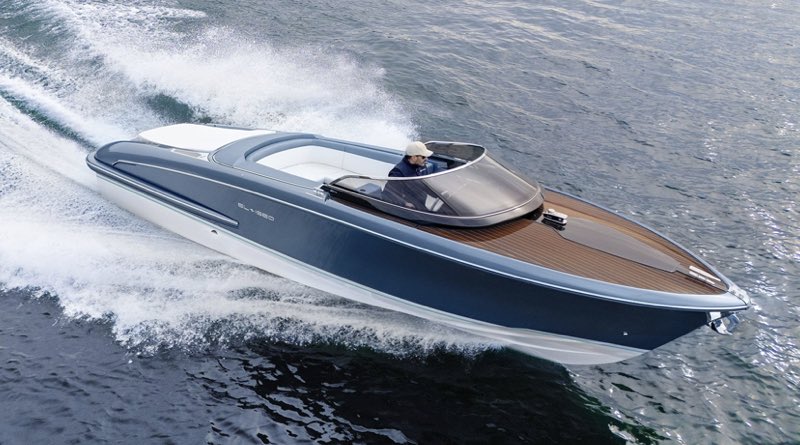 The formidable mix of innovation and heritage is perfectly captured by Riva El-Iseo, the brand’s first full-electric powerboat that launches the new E-Luxury segment under the banner of sustainability. Riva El-Iseo is a 27-foot (8.40 m) runabout with a maximum beam of 2.5 m and elegant and sophisticated lines, just like the much-loved and versatile Iseo from which it inherited the hull design.
The formidable mix of innovation and heritage is perfectly captured by Riva El-Iseo, the brand’s first full-electric powerboat that launches the new E-Luxury segment under the banner of sustainability. Riva El-Iseo is a 27-foot (8.40 m) runabout with a maximum beam of 2.5 m and elegant and sophisticated lines, just like the much-loved and versatile Iseo from which it inherited the hull design.
Italy

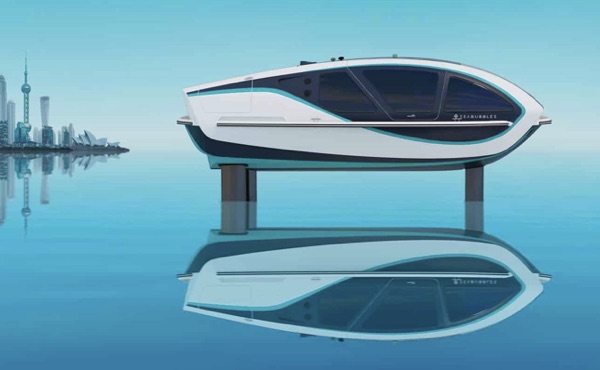 SeaBubbles designs and builds the latest generation craft with the motto “Zero Wave, Zero Noise, Zero Emission” thanks to the combination of a hybrid hydrogen-electric propulsion system and retractable foils. The SeaBubble H2 offers a sustainable mobility alternative in waterways as well as marine zones and protected areas.
SeaBubbles designs and builds the latest generation craft with the motto “Zero Wave, Zero Noise, Zero Emission” thanks to the combination of a hybrid hydrogen-electric propulsion system and retractable foils. The SeaBubble H2 offers a sustainable mobility alternative in waterways as well as marine zones and protected areas.

Product Range
Green Propulsion
Our innovative electric propulsion system empowered by the DeepSpeed jet:
Silent, efficient, zero emission
Green Propulsion
Our innovative electric propulsion system empowered by the DeepSpeed jet:
Silent, efficient, zero emission
Energy Management
Integrated smart system of energy storage for a better cruising experience

ELECTRIC YACHTING REDEFINED
DISCOVER A NEW ERA OF SUSTAINABLE YACHTING WITH SIALIA YACHTS.
Make a statement with this new breed of distinct electric yachts. Step into a world of emission-free yachting and explore the beauty of nature.
Established in 2017 by a team of visionaries, Sialia is a world-leading designer and builder of custom-built electric yachts powered by Ampros technology. The company has the technical knowledge and experience required to create the most advanced electric and ultralight yachts in the industry today.

Valkama All Electric Boat for Maximum Comfort and with Zero Emissions
A green shift in boating starts from Valkama – an electric aluminum boat with solar energy charging and storage station. Get ready for sustainable emission-free, silent and enjoyable boating!
Meet the Valkama Picnic Cruiser
The Valkama Picnic Cruiser is a hydrodynamic boat with all the right properties needed for a high-speed, long-range electric boating. The Valkama Picnic Cruiser offers the look and feel of a bigger boat. With electricity on board the Valkama Picnic Cruiser is equipped with yacht-like features such as a refrigerator, ceramic grill and high-quality sound system for enjoyable, sustainable and reasonably priced electric boating experience.
Mikkeli, Finland
We come from a better future.
Vita was founded to reduce the impact of boating on the marine environment through the development of an all-electric and integrated ecosystem of high-performance electric powertrains and fully electric yachts, supported by dedicated marine supercharging infrastructure.
Boats
Vita Seadog: 5.8m • 20 kt cruising speed, 30 kt top speed • 1 hour DC charge time
Vita SEAL: 7m • up to 30 kts • charging 10% – 90% in 40 min
<aserati Tidente: 10.5m • up to 35 kts • charging 10% – 90% in < 1 hour
Motors
Vita Power’s high performance systems integrate electric marine technology with proprietary control software to deliver peak power between 100hp and 660hp and DC fast charging capabilities.
Vita systems were the first to be compatible with high-speed DC charging on both CCS 1 (US) and CCS 2 (Europe) and are among the fastest charging on the market, supercharging from 10%-90% in under an hour.

